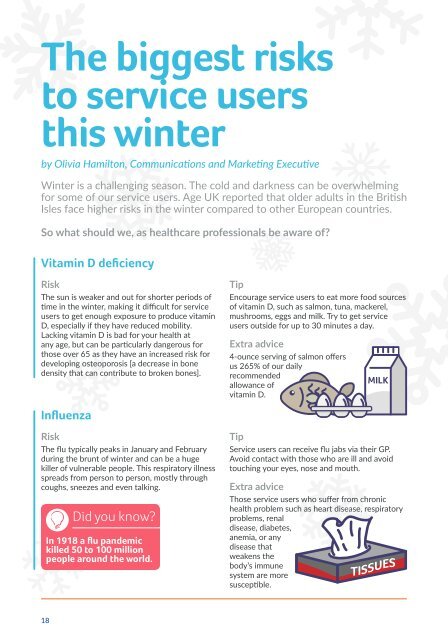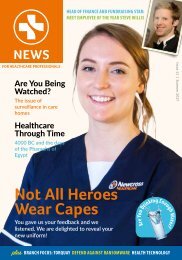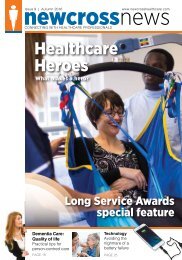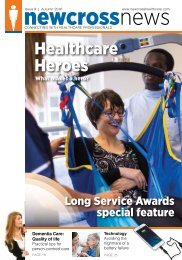Newcross News Issue 12
Winter edition
Winter edition
Create successful ePaper yourself
Turn your PDF publications into a flip-book with our unique Google optimized e-Paper software.
The biggest risks<br />
to service users<br />
this winter<br />
by Olivia Hamilton, Communications and Marketing Executive<br />
Winter is a challenging season. The cold and darkness can be overwhelming<br />
for some of our service users. Age UK reported that older adults in the British<br />
Isles face higher risks in the winter compared to other European countries.<br />
So what should we, as healthcare professionals be aware of?<br />
Vitamin D deficiency<br />
Risk<br />
The sun is weaker and out for shorter periods of<br />
time in the winter, making it difficult for service<br />
users to get enough exposure to produce vitamin<br />
D, especially if they have reduced mobility.<br />
Lacking vitamin D is bad for your health at<br />
any age, but can be particularly dangerous for<br />
those over 65 as they have an increased risk for<br />
developing osteoporosis [a decrease in bone<br />
density that can contribute to broken bones].<br />
Influenza<br />
Risk<br />
The flu typically peaks in January and February<br />
during the brunt of winter and can be a huge<br />
killer of vulnerable people. This respiratory illness<br />
spreads from person to person, mostly through<br />
coughs, sneezes and even talking.<br />
Did you know?<br />
In 1918 a flu pandemic<br />
killed 50 to 100 million<br />
people around the world.<br />
Tip<br />
Encourage service users to eat more food sources<br />
of vitamin D, such as salmon, tuna, mackerel,<br />
mushrooms, eggs and milk. Try to get service<br />
users outside for up to 30 minutes a day.<br />
Extra advice<br />
4-ounce serving of salmon offers<br />
us 265% of our daily<br />
recommended<br />
allowance of<br />
vitamin D.<br />
MILK<br />
Tip<br />
Service users can receive flu jabs via their GP.<br />
Avoid contact with those who are ill and avoid<br />
touching your eyes, nose and mouth.<br />
Extra advice<br />
Those service users who suffer from chronic<br />
health problem such as heart disease, respiratory<br />
problems, renal<br />
disease, diabetes,<br />
anemia, or any<br />
disease that<br />
weakens the<br />
body’s immune<br />
system are more<br />
susceptible.<br />
18









